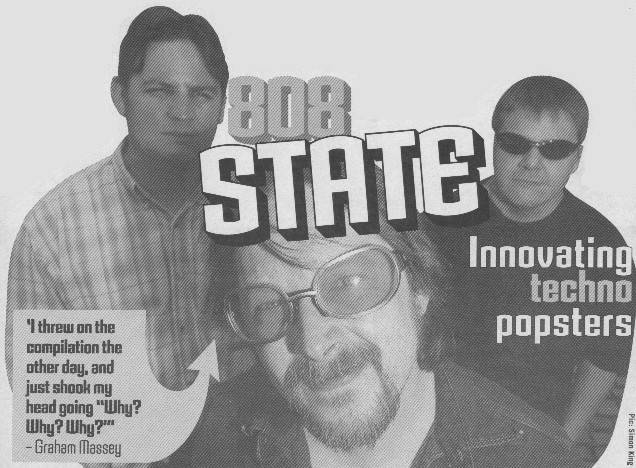| "You
know, the weirdest thing about putting together this compilation," laughs Graham
Massey leaning forward in a battered old studio armchair in a state of self-induced
bewilderment, "is realising how mad half the singles we put out really were. " I
threw on the compilation the other day," he continues, " and just shook my head
going 'Why? Why? Why?' At the time, I was mystified that a track like 'Lift' couldn't get
in the charts. But listening to it today, the reason's simple... it's about 18 different
tracks nailed together!" Graham and 808 partners Darren Partington and Andrew Barker
are perhaps Britain's only genuine pioneers of that most nebulous of terms, techno. 808
took the scene global before house mixes became de rigueur for every dodgy band
with a fat record company wallet. And there's their pioneering live spirit, too. Remember, this is the group who played Manchester's G-Mex to 14,500 people; the Hollywood Bowl with New Order in 1992 and whose "low-key" show last year at Manchester's Castlefield Arena pulled 8,500 punters. Not to mention scoring 18 Top 20 hits in the British charts alone. You want pop cultural significance? Someone's obviously not keeping the musical history books up to date. |
"Facts that were reported or ignored about house music in 1988 are never going to be set right," observes Darren, who'll talk the hind legs off a donkey at the slightest whirr of a tape recorder. "These inaccuracies have become the reference points for this whole 10th anniversary of acid house thing. There's a lot of lies out there that no one's there to contradict. "Years ago, we declined to do a lot of interviews, because we felt we had f*** all to do with that whole Madchester thing. Our culture was the dance scene that generated bands like the Mondays and The Stone Roses. 808 State represents this far more than bands like the lnspiral Carpets ever did. "Years ago, magazines like Rolling Stone would come over and insist on speaking to Shaun [Ryder] or lan Brown about dance music. They could only talk about dance music from a guitar angle. They really couldn't get their heads around it. Some still can't. That says so much about the significance of acid house as a movement before it became all supermarket. To 808, the culture was more important than its stars. That's the way we played it. . . " "And that's the reason why the initial culture was so quickly steamrollered over and lost," interjects Massey succinctly. | When the James Dean Bradfield-fronted "Lopez" single came out last year, a lot of people, only aware of 808 as Manc techno producers with hits like "Cubik", "Pacific State" and "In Yer Face" under their belts, had their preconceptions firmly turned upside-down. But throughout their history you can see a depth and musicality that reveals the group as subversive pop stars sneaking strange music into the charts on their own unique terms. The two tracks on the terrific "ex:el" album with Bjork, then re-emerging as a solo artist, along with "Spanish Heart" featuring New Order's Bernard Sumner and the aforementioned "Lift", all hint at depths easily overlooked in the rush to view 808 as mere acid 'ouse, mate. "This has always been our problem," agrees Massey. "After 'Pacific State' we went off at so many tangents that it's amazing people stuck with us. We've never followed a single with another one that sounded anything similar. That's our mistake and I'm proud of it. | "The
reason we're like this is because we started in the middle of a scene, the big bang of
acid house, where there were no rules, no guidelines. AIl we were doing was handing in
singles weekly to our record company. There were no politics because no one knew what was
right or wrong. The energy and the enthusiasm at that point was special, and it shows.
" By 1992 the scene, in Darren's eyes, had become sterile and thanks to a huge
eye-opening US tour with New Order, 808 State saw that new possibilities lay far outside
the fickle attentions of the UK. "We saw the way dance music was going,"
explains Andy, "and we just f***ed off round the world. If we hadn't done all this
travelling we wouldn't have lasted five years, let alone 10." Jazz festivals in
Brazil, US electronica tours with Aphex Twin, and a band residency in Hawaii (!?) awaited
808 when they left Britain. These broader influences became reflected in 808's musical
style, a style that becomes more and more idiosyncratic the more they evolve. It seems
that 808 State still haven't quite learnt the time-honoured industry law that dictates you
should be careful what you do for fear of alienating your audience. It's good to see that some people never learn their lessons. |
808 STATES! Brazil: "Because they can dance. Not like England where you just have a few jiggers at the front." Japan: "Because they're so passionate about music." Dallas, Texas: "One of the great musical pockets of the States." Glastonbury: "Because we got in there just as dance music was blowing up." Hollywood Bowl: "Because it just is the Hollywood Bowl." |
|||
 |
|||